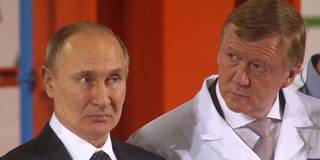None of the Russian “oligarchs” recently sanctioned by the West appears to have influence, much less control, over President Vladimir Putin. Western leaders might gain more by making them – and Anatoly Chubais, their former patron – comfortable enough to share whatever they may know about Putin’s wealth.
NEW YORK – Russian climate envoy Anatoly Chubais’s decision last week to resign from the government and leave Russia may turn out to be highly significant. By reopening a window on recent Russian history, Chubais’s exit could bring some order to the West’s “KleptoCapture” strategy, which aims to freeze the assets of about a dozen Russian “oligarchs” described as “appendages of Putin’s regime.” But it could potentially do much more.
Chubais, who was responsible for Russia’s mass privatization program under President Boris Yeltsin in the 1990s, is a living digest of how the country’s wealth was distributed. He was also an early promoter of Vladimir Putin as a competent successor to Yeltsin. And although Chubais has long since been outside Putin’s inner circle, he might well be able to lead the West to the president’s money – if he feels secure enough to talk.
Sanctioning Putin’s “appendages” sounds like a good idea, but Chubais knows that KleptoCapture, as it is currently conceived, is probably more smoke than fire. The current handful of targets got rich in the Yeltsin years but eventually found themselves at odds with Putin and left Russia, or remain there at his pleasure. They own what Putin allows them to own so long as they stay out of his way, and they have minimal influence. Today’s Kremlin insiders are Soviet-era spies and “red-director” holdovers who control most of the thousands of firms that were privatized between 1992 and 1996.

NEW YORK – Russian climate envoy Anatoly Chubais’s decision last week to resign from the government and leave Russia may turn out to be highly significant. By reopening a window on recent Russian history, Chubais’s exit could bring some order to the West’s “KleptoCapture” strategy, which aims to freeze the assets of about a dozen Russian “oligarchs” described as “appendages of Putin’s regime.” But it could potentially do much more.
Chubais, who was responsible for Russia’s mass privatization program under President Boris Yeltsin in the 1990s, is a living digest of how the country’s wealth was distributed. He was also an early promoter of Vladimir Putin as a competent successor to Yeltsin. And although Chubais has long since been outside Putin’s inner circle, he might well be able to lead the West to the president’s money – if he feels secure enough to talk.
Sanctioning Putin’s “appendages” sounds like a good idea, but Chubais knows that KleptoCapture, as it is currently conceived, is probably more smoke than fire. The current handful of targets got rich in the Yeltsin years but eventually found themselves at odds with Putin and left Russia, or remain there at his pleasure. They own what Putin allows them to own so long as they stay out of his way, and they have minimal influence. Today’s Kremlin insiders are Soviet-era spies and “red-director” holdovers who control most of the thousands of firms that were privatized between 1992 and 1996.